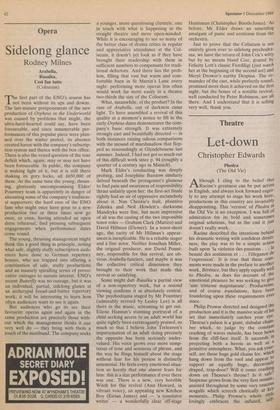Opera
Sidelong glance
Rodney Milnes
Arabella, Rusalka, Cosi fan tutte (Coliseum) The first part of the ENO's season has not been without its ups and downs. The last-minute postponement of the new production of Orpheus in the Underworld was caused by problems that might, the ultra-hard-hearted could say, have been foreseeable, and since innumerable per- formances of this popular piece were plan- ned over the winter period, its absence created havoc with the company's subscrip- tion system and thence with the box office. There is also the vexed question of the tour deficit which, again, may or may not have been foreseeable. In public, the company is making light of it, but it is still there shaking its gory locks, all £650,000 of them. At the same time the young, thrust- ing, gloriously uncompromising Elder/ Pountney team is apparently in danger of alienating some of the company's tradition- al supporters; the hard core of the ENO fans who might once have gone to a new production two or three times now go once, or even, having attended an open dress rehearsal, find pressing subsequent engagements when performance dates come round.
The young, thrusting management might think this a good thing in principle, noting what safe, slightly stuffy subscription audi- ences have done to German repertory houses, who are trapped into offering a combination of safe, stuffy productions and an insanely spiralling series of provo- cative outrages to sustain interest. ENO's recent Butterfly was no outrage, but it was an individual, partial, sidelong glance at an archetypal bread-and-butter repertory work; it will be interesting to learn how, often audiences want to see it again.
But audiences who go to see their favourite operas again and again in the same production are precisely those with- out which the management thinks it can very well do — they bring with them a touch of the moribund. The company seeks
a younger, more questioning clientele, one in touch with what is happening in the straight theatre and more open-minded. While it is encouraging to see so many of the better class of drama critics in regular and appreciative attendance at the Col- iseum, it doesn't yet look as if they have brought their readership with them in sufficient numbers to compensate for tradi- tional defectors. And there lies the prob- lem, filling that vast but warm and com- fortable barn in St Martin's Lane every night: performing more operas less often would work far more easily in a theatre two-thirds the size of the Coliseum.
What, meanwhile, of the product? In the case of Arabella, out of darkness came light. To have assembled a revival of this quality at a moment's notice to fill in the early Orpheus dates demonstrates the com- pany's basic strength. It was extremely strongly cast and beautifully directed — in both instances raising odious comparisons with the mound of marshmallow that flop- ped so resoundingly at Glyndebourne last summer. Indeed, I had not got so much out of this difficult work since p. 94 (roughly a quarter of a century ago in Munich).
Mark Elder's conducting was deeply probing, and Josephine Barstow similarly delved beneath the protagonist's glamour to find pain and awareness of responsibility thrust unfairly upon her: the first-act finale rightly had an air of oppressive melancholy about it. Nan Christie's frail, plaintive Zdenka and Neil Howlett's darksome Mandryka were fine, but most impressive of all was the casting of the two impossible tenor roles — Graham Clark (Matteo) and David Hillman (Elemer). In a tenor-short age, the rarity of Mr Hillman's appear- ances is inexplicable. He is a reliable singer and a fine actor. Neither Jonathan Miller, the original producer, nor David Pount- ney, responsible for this revival, are ob- vious Arabella-fanciers, and maybe it was the collective critical dimension they brought to their work that made this revival so satisfying.
Some might dub Rusalka a partial view of a non-repertory work, but a second viewing confirms it as absolutely central. The psychodrama staged by Mr Pountney (admirably revived by Lesley Lee) is all there in the music, screaming to get out. Eilene Hannan's stunning portrayal of a child seeking access to an adult world has quite rightly been extravagantly praised, so much so that I believe John Treleaven's impersonation of an adult doing precisely the opposite has been seriously under- valued. His voice grows ever more sump- tuous of tone and sensuous of phrase, and the way he flings himself about the stage without fear for his person is distinctly untenorial. He feels every emotional situa- tion so keenly that one almost fears for him: this is a star performance if ever there was one. There is a new, very horrible Witch for this revival (Ann Howard, in vibrant voice), an appealing new Kitchen Boy (Eirian James) and — 'a translator writes' — a wonderfully clear off-stage Huntsman (Christopher Booth-Jones). As before, Mr Elder draws an unsettling amalgam of panic and eroticism from the orchestra.
Just to prove that the Coliseum is not entirely given over to sidelong psychodra- ma, we have the return of John Cox's witty but by no means bland Cosi, graced by Felicity Lott's classic Fiordiligi (just watch her at the beginning of the second act) and Meryl Drower's earthy Despina. The re- mainder of the cast, while perfectly sound, promised more than it achieved on the first night, but the bones of a notable revival, well conducted by Peter Robinson, are all there. And I understand that it is selling very well, thank you.






















































 Previous page
Previous page